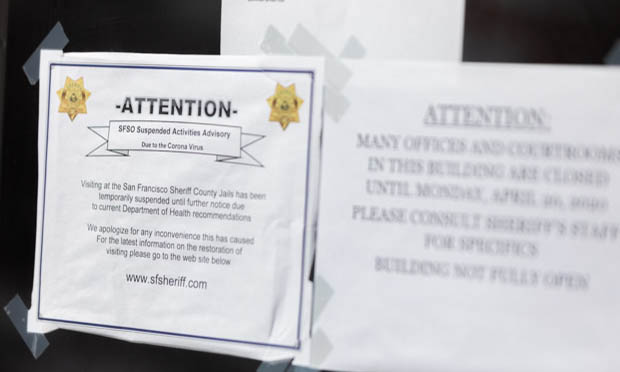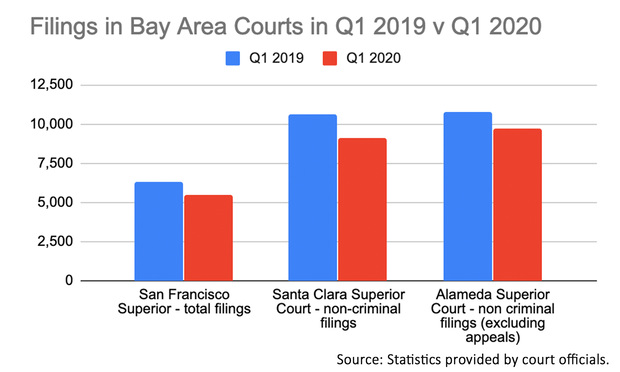A Decline Before the Dropoff: Bay Area Courts Saw Decreased Activity in Q1 as COVID-19 Changes Took Hold
Recently released statistics from state courts in Alameda, Santa Clara and San Francisco indicate how court closures at the end of March affected the number of civil filings in the first quarter and point to the backlog courts will face as they begin to reopen to non-emergency cases.
May 11, 2020 at 06:00 AM
5 minute read
 San Francisco Superior Court at 850 Bryant Street with posted notices annoucing many offices within the building closed in compliance with the shelter in place order. Photo: Jason Doiy/ALM
San Francisco Superior Court at 850 Bryant Street with posted notices annoucing many offices within the building closed in compliance with the shelter in place order. Photo: Jason Doiy/ALM
As COVID-19 court closures that took hold in the last two weeks of March—the last two weeks of the first quarter of the year—led to a dramatic drop in the number of new civil filings seen in three major San Francisco Bay Area courts.
According to data provided by Superior Court officials in Alameda, Santa Clara and San Francisco Counties, noncriminal filings were down significantly for the first three months of 2020 compared to the same period last year.
In San Francisco Superior Court, total filings fell off from 6,310 in the first quarter of 2019 to 5,506 during the same period this year, a 12.7% drop.
In Santa Clara Superior, total noncriminal case filings dropped by nearly 14%, from 10,586 in the first quarter of 2019 to 9,109 in the same period of 2020. Civil filings in Santa Clara dropped even more precipitously, falling by 16.6% from 6,640 to 5,535 year-over-year.
In Alameda County Superior, noncriminal filings excluding appeals fell off by 9.7% from 10,767 in the first quarter of 2019 to 9,719 over the same period in 2020. (Editor's note: Alameda court's data for appeals has been excluded since those numbers did not include filings from March 2020.) The number of unlimited civil filings in Alameda County fell off by nearly 12%, from 2,443 to 2,157 year-over-year.

While the falloff from Q1 2019 to Q1 2020 was dramatic, litigators say that having the state courts limited to only the most urgent civil filings will lead to an even steeper dropoff in the numbers for the second quarter.
"The percentage of filings being down right now is irrelevant to the overall impact on attorneys and their clients," says Micha Star Liberty of the Liberty Law Office in Oakland. "The 30,000 food view is that an entire branch of government has been unable to effectively function at even a minimal level on the civil side."
Liberty, the current president of the Consumer Attorneys of California, the plaintiffs bar's largest statewide membership organization, said that it is "shocking and dismaying" that the court system "at the heart of technology and innovation" has been brought to a crawl by the limitations imposed by the COVID-19 pandemic. "There are some judges who are keeping up and doing what they can remotely," she said. "The struggle is to get the presiding judges in all of the counties and the judicial council to work together," she said.
The Judicial Council last month used new powers granted by the Gov. Gavin Newsom to adopt emergency statewide rules that the CAOC and other groups asked for stopping the clock on civil matters filed between April 6 and 90 days after the governor lifts the state of emergency related to COVID-19. The Judicial Council has since taken additional steps to help keep civil suits on track in the state including allowing parties represented by counsel to be served electronically, forgoing the need for in-person service.
Even with those steps, lawyers with active state court dockets are setting trial dates and hearing dates pushed back. Most expect courtrooms to be dedicated to criminal proceedings in the near-term and a significant civil backlog, especially as cases related to the COVID-19 pandemic itself start hitting the dockets.
Morrison & Foerster's Arturo Gonzalez said that given the tolling of the statute of limitations, and the financial hardship many people and companies are experiencing, there is no urgency to filing legal actions at this time. "However, there will likely be a flood of lawsuits later this year when the tolling is lifted, including commercial unlawful detainers," he said.
Warren Metlitzky, a founding partner of San Francisco trial boutique Conrad & Metlitzky, said he expects the volume of COVID-19 related litigation is going to surprise some. "Is there anyone who has a commercial contract or employment contract that wasn't affected by this?" Metlitzky said.
Although he said not all those affected contracts will or should lead to litigation, the act there are "a bunch of people who are struggling and looking for ways to get money—that leads to lawsuits."
Metlitzky said, "When times are hard, I wouldn't be surprised to see filings go up."
This content has been archived. It is available through our partners, LexisNexis® and Bloomberg Law.
To view this content, please continue to their sites.
Not a Lexis Subscriber?
Subscribe Now
Not a Bloomberg Law Subscriber?
Subscribe Now
NOT FOR REPRINT
© 2025 ALM Global, LLC, All Rights Reserved. Request academic re-use from www.copyright.com. All other uses, submit a request to [email protected]. For more information visit Asset & Logo Licensing.
You Might Like
View All
Apple Files Appeal to DC Circuit Aiming to Intervene in Google Search Monopoly Case
3 minute read

Hawaii wildfire victims spared from testifying after last-minute deal over $4B settlement
4 minute read
State Appeals Court Revives BraunHagey Lawsuit Alleging $4.2M Unlawful Wire to China
3 minute readLaw Firms Mentioned
Trending Stories
Who Got The Work
J. Brugh Lower of Gibbons has entered an appearance for industrial equipment supplier Devco Corporation in a pending trademark infringement lawsuit. The suit, accusing the defendant of selling knock-off Graco products, was filed Dec. 18 in New Jersey District Court by Rivkin Radler on behalf of Graco Inc. and Graco Minnesota. The case, assigned to U.S. District Judge Zahid N. Quraishi, is 3:24-cv-11294, Graco Inc. et al v. Devco Corporation.
Who Got The Work
Rebecca Maller-Stein and Kent A. Yalowitz of Arnold & Porter Kaye Scholer have entered their appearances for Hanaco Venture Capital and its executives, Lior Prosor and David Frankel, in a pending securities lawsuit. The action, filed on Dec. 24 in New York Southern District Court by Zell, Aron & Co. on behalf of Goldeneye Advisors, accuses the defendants of negligently and fraudulently managing the plaintiff's $1 million investment. The case, assigned to U.S. District Judge Vernon S. Broderick, is 1:24-cv-09918, Goldeneye Advisors, LLC v. Hanaco Venture Capital, Ltd. et al.
Who Got The Work
Attorneys from A&O Shearman has stepped in as defense counsel for Toronto-Dominion Bank and other defendants in a pending securities class action. The suit, filed Dec. 11 in New York Southern District Court by Bleichmar Fonti & Auld, accuses the defendants of concealing the bank's 'pervasive' deficiencies in regards to its compliance with the Bank Secrecy Act and the quality of its anti-money laundering controls. The case, assigned to U.S. District Judge Arun Subramanian, is 1:24-cv-09445, Gonzalez v. The Toronto-Dominion Bank et al.
Who Got The Work
Crown Castle International, a Pennsylvania company providing shared communications infrastructure, has turned to Luke D. Wolf of Gordon Rees Scully Mansukhani to fend off a pending breach-of-contract lawsuit. The court action, filed Nov. 25 in Michigan Eastern District Court by Hooper Hathaway PC on behalf of The Town Residences LLC, accuses Crown Castle of failing to transfer approximately $30,000 in utility payments from T-Mobile in breach of a roof-top lease and assignment agreement. The case, assigned to U.S. District Judge Susan K. Declercq, is 2:24-cv-13131, The Town Residences LLC v. T-Mobile US, Inc. et al.
Who Got The Work
Wilfred P. Coronato and Daniel M. Schwartz of McCarter & English have stepped in as defense counsel to Electrolux Home Products Inc. in a pending product liability lawsuit. The court action, filed Nov. 26 in New York Eastern District Court by Poulos Lopiccolo PC and Nagel Rice LLP on behalf of David Stern, alleges that the defendant's refrigerators’ drawers and shelving repeatedly break and fall apart within months after purchase. The case, assigned to U.S. District Judge Joan M. Azrack, is 2:24-cv-08204, Stern v. Electrolux Home Products, Inc.
Featured Firms
Law Offices of Gary Martin Hays & Associates, P.C.
(470) 294-1674
Law Offices of Mark E. Salomone
(857) 444-6468
Smith & Hassler
(713) 739-1250






